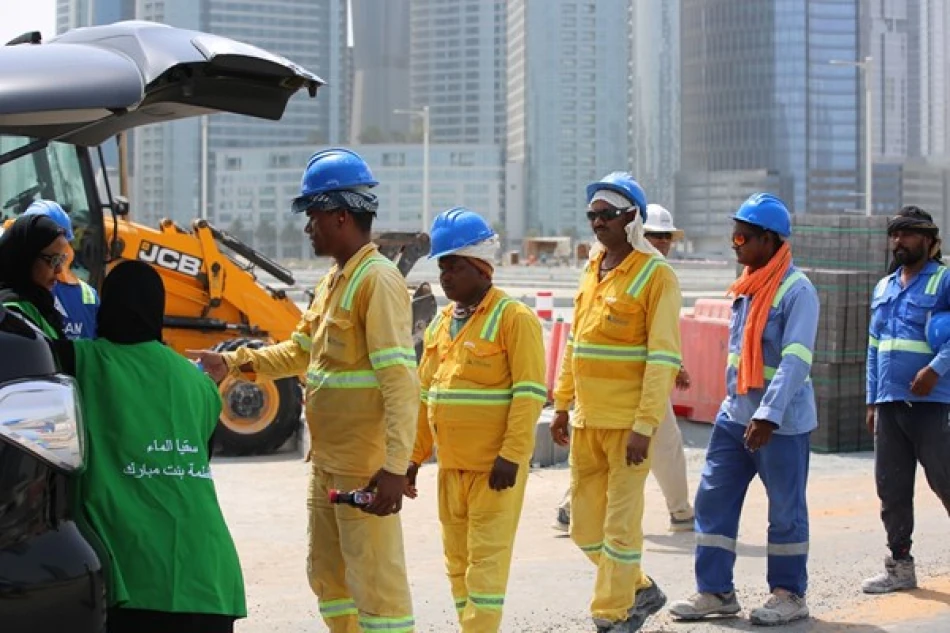
Sheikha Fatima's Guidance Fuels UAE Women's Union's "Saqiya Al Maa" Water Initiative
UAE's Water Initiative Shows How Small Acts Create Big Social Impact
The UAE General Women's Union continues its annual "Water Relief - Fatima bint Mubarak" initiative, now in its eighth year, providing essential hydration and shade to thousands of outdoor workers during the scorching summer months. What began as a simple water distribution program has evolved into a model for corporate social responsibility that other Gulf nations are beginning to emulate.
Beyond Water: A Comprehensive Worker Welfare Program
The initiative, launched under the patronage of Sheikha Fatima bint Mubarak, extends far beyond basic hydration. Workers receive water, juices, and dates—culturally significant foods that provide quick energy and electrolytes. More importantly, the program includes protective umbrellas and cooling equipment at outdoor work sites during peak heat hours.
Operating throughout July, August, and September when temperatures regularly exceed 45°C (113°F), the program targets construction workers, landscapers, and maintenance crews across Abu Dhabi emirate. These workers, predominantly from South Asian countries, form the backbone of the UAE's infrastructure development but often lack adequate heat protection.
Strategic Partnerships Drive Expansion
This year's program has expanded its geographical reach through partnerships with government entities and private companies. The collaborative approach reflects a broader trend in the Gulf region where public-private partnerships address social challenges more effectively than government programs alone.
The expansion comes at a critical time. Climate data shows summer temperatures in the UAE have increased by an average of 1.5°C over the past decade, making outdoor work increasingly dangerous without proper precautions.
Regional Context: Gulf States Compete on Worker Welfare
The UAE's initiative arrives as Gulf nations face mounting international pressure over worker conditions. Qatar's World Cup preparations sparked global scrutiny of labor practices, while Saudi Arabia's Vision 2030 megaprojects require millions of outdoor workers.
Unlike Qatar's reactive approach to worker welfare criticism, the UAE has proactively developed programs that address both immediate needs and long-term social cohesion. The water initiative complements recent labor law reforms that include mandatory midday work breaks during summer months and improved accommodation standards.
Economic Logic Behind Social Programs
From an economic perspective, the initiative makes strategic sense. Heat-related illnesses cost the UAE construction sector an estimated AED 2.3 billion annually in lost productivity and medical expenses. Preventive programs like water distribution reduce these costs while improving worker retention—a critical factor as the UAE competes with other Gulf states for skilled labor.
The program also serves the UAE's soft power objectives. As the country positions itself as a global hub for business and tourism, demonstrating care for vulnerable populations enhances its international reputation and attracts socially conscious investors.
Measuring Impact: Beyond Numbers
Noura Khalifa Al Suwaidi, Secretary-General of the General Women's Union, emphasizes that the initiative builds "loyalty and belonging" among beneficiaries. This psychological impact may prove more valuable than the immediate physical relief.
Research from similar programs in Singapore and Hong Kong suggests that employer-sponsored welfare initiatives significantly reduce worker turnover and improve productivity. In the UAE's competitive labor market, companies that participate in such programs report 15-20% lower staff turnover rates.
Sustainability Questions
The initiative's eight-year track record demonstrates institutional commitment, but questions remain about long-term sustainability. As climate change intensifies, will voluntary programs suffice, or will mandatory regulations become necessary?
Other Gulf states are watching closely. Oman recently launched a similar program, while Bahrain is considering legislation requiring employers to provide cooling stations at outdoor work sites. The UAE's voluntary approach may influence regional standards for worker protection.
A Template for Corporate Responsibility
The water initiative represents more than charity—it's a calculated investment in social stability and economic productivity. By addressing immediate worker needs while building cross-cultural goodwill, the program demonstrates how targeted social initiatives can strengthen the social contract between governments, employers, and migrant workers.
As the Gulf region continues its economic diversification away from oil, maintaining social cohesion becomes increasingly critical. Programs like this water initiative may prove essential for countries seeking to build sustainable, inclusive economies in an era of climate change and global labor mobility.
Most Viewed News

 Layla Al Mansoori
Layla Al Mansoori






